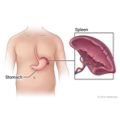Healthwise
Our Health Library information does not replace the advice of a doctor. Please be advised that this information is made available to assist our patients to learn more about their health. Our providers may not see and/or treat all topics found herein.
Thrombocytopenia
Conditions Basics
What is thrombocytopenia?
Thrombocytopenia (say "throm-buh-sy-tuh-PEE-nee-uh") is a low number of platelets in the blood. Platelets are the cells that help blood clot. If you don't have enough of them, your blood can't clot well. That means it's harder to stop bleeding.
What causes it?
You may have low platelets because your bone marrow doesn't make them. Or your body's defenses (immune system) may destroy them.
Having an enlarged spleen can also reduce the number of platelets in your blood. This is because they can get trapped in the enlarged spleen.
Some diseases or medicines may also cause low platelets. But platelets may go back to normal levels if you treat the disease or stop using the medicine.
What are the symptoms?
Symptoms of thrombocytopenia include:
- Bruising easily.
- Pinpoint-sized red spots around the feet and ankles. These tiny spots are called petechiae. In more serious cases, the spots are larger and more widespread. These larger spots are called purpura.
- Nosebleeds.
- Heavy menstrual flow.
How is thrombocytopenia treated?
Treatment for low platelets starts with finding a cause that can be stopped. For example, your doctor may change a drug you take or treat an infection you have.
Treatment may include:
- Injecting platelets into a vein. This is called platelet transfusion.
- Taking medicines to stop the body from destroying the platelets.
- Taking medicine that helps the body make more platelets.
- Having surgery to remove the spleen.
You may not need treatment if your problem is mild.
Credits
Current as of: October 7, 2024
Current as of: October 7, 2024




